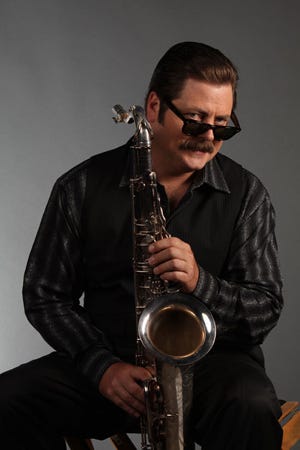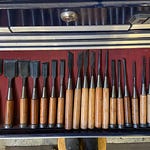Joan Barrett and Ted Moores of Peterborough, Ontario ask,
“We have two questions from here, Nick: Ted wants to know what influence your Dad had on you growing up—I think we know some of the ways from reading your books, but how the heck did he manage? And I want to know when you are going to kayak Georgian Bay with me and my buddies.”
Thank you very kindly for your questions, Joan and Ted, and for those Muleteers who are unaware, here we have two dear old friends of mine who run Bear Mountain Boats. Ted wrote the book Canoe Craft, from which I learned to build canoes, and their whole operation is a delight—do please avail yourselves of their website and books.

I’ll address your query first, Joan: I’ll come paddle a kayak with you as soon as I can shoehorn it into the circus that is my calendar. Let’s say definitely before the sun sets on 2023. I’m extremely excited to do it, but also a bit trepidatious, as I’ve never done more than long day paddles. What I guess I’m saying is: please be gentle with me.
I know such paddling requires a degree of effort that promises to test my mulish stamina. I did some stand-up paddle boarding with my pal Ben in Puerto Rico a couple weeks ago, in pretty rough water, so it was more like take-a-knee paddle boarding (but there were 4 or 5 manatees surfacing around us, blowing snuffly blessings at our efforts to stay upright, like ponderous, aquatic cheerleaders). Ben was mightily keeping his feet, but after a few less-than-acrobatic dunkings on my part, I chose to remain on my knees for 75% of the afternoon.
Although the outing could be perceived as a failure from an athletic point of view, the lesson I took away from that day was that, between the beautiful turquoise salt water, the sun sparkling on the rolling swells of the laguna, the friendly sea cows, the fellowship with Ben, and the eventual sunset, not to mention the substantial workout, the day was an utter victory. I wonder if there will be any neighborly sturgeon or muskie swimming along with us in Georgian Bay? Can we fish? I suppose you had better bring a towline in case I break a nail. :?(
As for Ted’s question, it’s hard to separate my Dad out from my Mom and Dad when it comes to talking about rearing me and my three siblings. With me specifically, they were extremely patient. They both tried their durndest to teach me to work hard and to be honest and decent. To use good manners, and let my virtuous actions speak for me, rather than my words. Naturally, as kids are wont to do, I said, “Ok, thank you, Mom and Dad, I hear you, and let me just workshop some alternative methods to your suggestions so that I can determine if your whole “decent and wholesome citizen” thing is going to work for me.
Bless them and their forbearance, as I experimented with new ideas, innovative to our household, like dishonesty and thievery. When word of some classroom indiscretion of mine would reach them at home, they, to their credit, would treat me with unflagging support and refrain from sending me away to military school or a work farm. For the life of me, I have no idea where my nefarious impulses came from. I recall stealing a Matchbox car from my friend Dave, then, when it turned up missing, “finding it", and lying about it. I apparently needed to learn for myself that crime is, in fact, bad, and that a solid work ethic is where it’s at. Like many of life’s lessons, I apparently needed to learn it a few times.
By supporting me through the “asshole years”, and never giving up on me, my folks gave me the priceless gift of that early foundation young people need beneath them, allowing them to try out different avenues and ways of being until a fruitful vocation can be discovered, and adulthood and responsibility can begin to set in. For me, that meant getting myself into college to study theatre and simultaneously develop my carpentry skills.
Now I’m in my fifties, doing my best to emulate the generous lives of selflessness that my parents have logged, with the full understanding that I’ll never come close to their accomplishments. But I’ll be forever grateful that they taught me how to try my damnedest.
Midnite Train, of the internet, asks,
“My question relates to your experience with rejection. If your audience is not buying what you're selling, how do you bounce back and keep going (in a slightly modified direction)? How has it shaped your career? Any advice on how not to let the negative feedback crush the fun out of a creative person's life?”
Midnite, thank you very kindly for these great questions.
I started theatre school in 1988, finished in 1993, and worked professionally in Chicago Theatre until I moved to Los Angeles in 1997. Once I got to California, I continued to slowly amass experience and acumen as I inexorably pursued a successful (creatively satisfying plus remunerative) artistic career. I was cast in the role of Ron Swanson in early 2009, which turned out to be a massively big break in my career, changing my life profoundly in almost every way.
So, for starters, I’ll focus on the 20 years or so that I was trying out different character ideas and other acting flourishes in auditions or onstage, then eventually onscreen. These experiences were simply riddled with rejection. I’d guess that, across those two decades, I was probably batting about .100, meaning I was getting cast once out of every ten auditions, which is actually not that bad a rate at all, despite how dejecting it felt.
The thing was, I never took it too personally. For most of the early years, I understood that I was not particularly good at acting yet. I still don’t feel like I’m amazing at it—I certainly know my strengths, and have come to powerfully listen to my gut in that regard. And I guess that was the key, knowing that I would make choices based on my gut, and that quite often those choices wouldn’t jibe with the ideas or the gut reaction that the directors or producers might have been feeling. Once I understood this, maybe starting in my early thirties, I no longer felt rejection as much as simply frustration that I hadn’t found the right people and project yet; those that would recognize my main strengths (talking slow and, also, not talking).
I had a sensibility; a manner that I thought was funny, and eventually others did too. When Mike Schur and Greg Daniels finally cast me as Ron Swanson, and people reacted very positively to our collaboration on that character, all of those past rejections and frustrations were vindicated, because I had been so extremely lucky as to find the niche in which my particular weird humor could work. It has subsequently allowed others to see my strengths (like eating meat and carrying objects), and then offer me other jobs based upon them.
So, let’s briefly examine the logic employed in showbiz rejection vs. acceptance:
Rejectors: “This guy doesn’t even hardly talk. He sucks!”
Acceptors: “This guy barely talks. He’s terrific!”
Once that fully sank in for me, I was able to let go of feelings of rejection in the knowledge that it is almost never personal. Unless a director has a specific reason to dislike you, like you’ve stolen their Matchbox car.
But even after that epiphany, every new project is still a unique challenge. One of the reasons I write books and songs and tour as a humorist is to continue to explore my ability to entertain an audience satisfactorily. Although I do pretty ok in terms of selling tickets and books, I’m not doing Dan Brown-level numbers by any stretch, and I get plenty of negative feedback on those endeavors. Nonetheless, I love doing the work and trying to make something that people will find to be medicinal in some way, whether it makes them think, or laugh, or get misty. As long as I continue getting that loving feedback as well, then I can bear the criticisms that come my way.
There’s no field in which I’m a virtuoso, except again, perhaps not-talking, so it’s never a surprise if someone says, “This work has flaws—it could be better.” I usually think, “Yes, I agree.” Or sometimes, of course, I think, “No, you’re just dumb.” There’s flawed, but then there’s also “You just don’t get it.”
I pay attention to the world and the feedback I receive. Like, for example, I love to sing and play music, so much. Across my life I have been in school chorus, swing choir, musicals, concert band, marching band, jazz band, you name it. I played tenor sax, baritone sax, trap set, and tri-toms. I won my high school’s Louis Armstrong jazz award. But between me and the audience, something never quite clicked for me, musically. Especially with singing—I can carry a tune and sing with competence, but I always noticed that nobody ever asked me to sing. I was never chosen for the solo, as it were, and so that was a rejection that I took onboard and said, “Ok, what else can I do?”
So I think it’s also important to understand which rejections to heed and which to ignore. If you feel called to make something, whether it’s a painting or a song or a canoe or a comedy special or a brisket or an exquisitely crafted tax form, then you should do that because it makes you feel good. That’s the baseline. Sometimes, then, there are bonuses to your calling, like maybe you can get paid to make the thing you love. But the important thing, I think, is that as long as you love what you do, then everybody else can go to hell if they don’t like it.
Love,
Oh, hey, still here? If you would like to become a paid subscriber, you’ll get to see additional medium-jazz fare, like this weekend I intend to post a video of me performing a song that might include some lyrics about Ron Swanson. Also, when there’s bonus content, only paying Muleteers get to leave comments and questions. That said, today everyone please leave your questions in the comments and I’ll continue to answer to the best of my donkey ability.
























